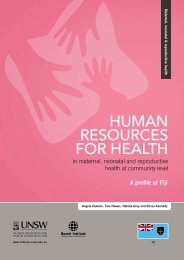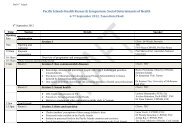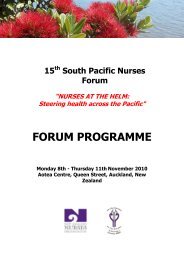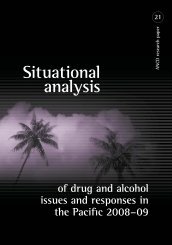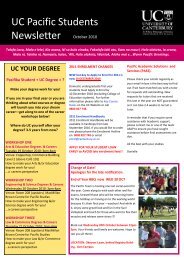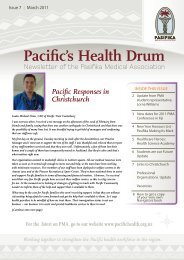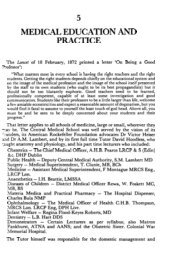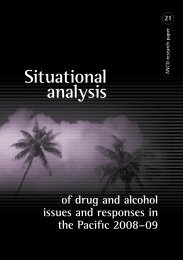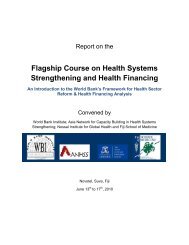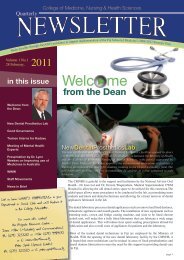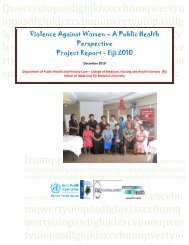a review of health leadership and management capacity in fiji - HRH ...
a review of health leadership and management capacity in fiji - HRH ...
a review of health leadership and management capacity in fiji - HRH ...
Create successful ePaper yourself
Turn your PDF publications into a flip-book with our unique Google optimized e-Paper software.
SUMMARY<br />
Access <strong>and</strong> utilisation <strong>of</strong> <strong>health</strong> care<br />
• The Fijian <strong>health</strong> system was constructed to serve a rural<br />
population but is now under pressure to modify itself <strong>in</strong><br />
response to urban migration. Fiji is now 51% urbanised.<br />
Urban migration applies to the pr<strong>of</strong>essions as well, so it has<br />
been difficult to reta<strong>in</strong> staff at the sub-divisional level.<br />
• About 70–80% <strong>of</strong> the population has access to primary<br />
<strong>health</strong> care but only about 40% has access to quality<br />
<strong>health</strong> services due to population dispersal.<br />
F<strong>in</strong>anc<strong>in</strong>g the <strong>health</strong> system<br />
• The Fijian <strong>health</strong> system is essentially publically funded<br />
with a small proportion (about 3% <strong>in</strong> 2008) <strong>of</strong> the overall<br />
budget provided by development partners. The proportion<br />
<strong>of</strong> GDP allocated to <strong>health</strong> is among the lowest <strong>in</strong> the world<br />
<strong>and</strong> lower than many <strong>of</strong> its neighbours.<br />
• Sub-divisional <strong>health</strong> staff manage <strong>health</strong> activities<br />
with<strong>in</strong> budgets <strong>and</strong> accord<strong>in</strong>g to prescribed processes,<br />
hav<strong>in</strong>g little flexibility other than to conform to scheduled<br />
activities. However, the degree to which they can mobilise<br />
communities to apply their own resources to <strong>health</strong><br />
improvements depends on their will<strong>in</strong>gness to engage with<br />
community leaders.<br />
Human resources for <strong>health</strong><br />
• SDMOs are responsible for day-to-day <strong>management</strong> <strong>of</strong><br />
the local <strong>health</strong> staff with<strong>in</strong> Public Service Commission<br />
systems, <strong>and</strong> act on central M<strong>in</strong>istry <strong>of</strong> Health decisions<br />
on deployment <strong>and</strong> access to tra<strong>in</strong><strong>in</strong>g.<br />
• In rural areas, SDMOs <strong>and</strong> SDHSs coord<strong>in</strong>ate <strong>and</strong> supervise<br />
<strong>health</strong> centre <strong>and</strong> nurs<strong>in</strong>g station staff, <strong>in</strong>clud<strong>in</strong>g oversee<strong>in</strong>g<br />
them <strong>in</strong> screen<strong>in</strong>g <strong>and</strong> team programs (such as school<br />
visits). Reta<strong>in</strong><strong>in</strong>g staff <strong>in</strong> rural areas requires SDMOs to<br />
engage <strong>in</strong> team build<strong>in</strong>g.<br />
Health <strong>management</strong> structure<br />
• The Fijian <strong>health</strong> system has undergone a short period <strong>of</strong><br />
decentralisation <strong>and</strong> then recentralisation with significant<br />
changes to <strong>management</strong> roles <strong>and</strong> systems <strong>and</strong> to the<br />
career expectations <strong>of</strong> <strong>health</strong> managers <strong>in</strong> the divisions.<br />
The recentralisation has aga<strong>in</strong> lengthened l<strong>in</strong>es <strong>of</strong><br />
communication <strong>and</strong> broadened the span <strong>of</strong> control.<br />
Number <strong>and</strong> distribution <strong>of</strong> managers<br />
• All <strong>health</strong> adm<strong>in</strong>istration personnel are employed by the<br />
Public Service Commission <strong>and</strong> may be transferred to<br />
another M<strong>in</strong>istry if required. A small number <strong>of</strong> specialist<br />
<strong>health</strong> adm<strong>in</strong>istrators <strong>and</strong> accountants have developed<br />
their careers with<strong>in</strong> the M<strong>in</strong>istry <strong>of</strong> Health.<br />
• At the sub-divisional level 19 SDMOs <strong>and</strong> 19 SDHSs<br />
manage the <strong>in</strong>tegrated hospitals, <strong>health</strong> centres, nurs<strong>in</strong>g<br />
stations <strong>and</strong> community <strong>health</strong> services.<br />
Competence <strong>of</strong> sub-divisional <strong>health</strong> managers<br />
• No sub-divisional medical <strong>of</strong>ficer has acquired a<br />
<strong>management</strong> qualification, although a small number have<br />
been exposed to <strong>management</strong> tra<strong>in</strong><strong>in</strong>g <strong>in</strong> Master <strong>of</strong> Public<br />
Health programs, <strong>and</strong> others to Public Service Commission<br />
or donor-provided short programs.<br />
• Health adm<strong>in</strong>istration tra<strong>in</strong><strong>in</strong>g programs have been difficult<br />
to susta<strong>in</strong> despite several attempts. Consequently a cadre <strong>of</strong><br />
pr<strong>of</strong>essional <strong>health</strong> adm<strong>in</strong>istrators has not been developed.<br />
Management work<strong>in</strong>g environment<br />
• An unstable work<strong>in</strong>g environment <strong>and</strong> dissatisfaction<br />
among Fijian <strong>health</strong> workers due partly to lack <strong>of</strong> sufficient<br />
opportunities for promotion, heavy workloads, <strong>in</strong>adequate<br />
supportive supervision <strong>and</strong> poor remuneration, reduce the<br />
appeal <strong>of</strong> a <strong>health</strong> <strong>management</strong> career <strong>and</strong> feed emigration.<br />
Function<strong>in</strong>g <strong>of</strong> <strong>management</strong> support systems<br />
• Purchas<strong>in</strong>g <strong>and</strong> supply systems (particularly <strong>of</strong><br />
pharmaceuticals, consumables <strong>and</strong> technical equipment<br />
ma<strong>in</strong>tenance) require specialist <strong>management</strong> to ensure<br />
supply. Sub-divisional medical <strong>of</strong>ficers are responsible for<br />
manag<strong>in</strong>g public sector dispensaries <strong>in</strong> their areas.<br />
• Health system <strong>in</strong>formation flows towards the centre, but<br />
little returns to the periphery to assist with operational<br />
<strong>management</strong>. Information systems are biased towards<br />
disease rates rather than <strong>management</strong> <strong>in</strong>dicators.<br />
The socio-cultural context<br />
• Government anti-discrim<strong>in</strong>ation policy has replaced a<br />
history where ethnicity had the potential to limit career<br />
opportunities. In addition, female managers are well<br />
accepted <strong>in</strong> Fiji <strong>and</strong> many <strong>of</strong> the most senior M<strong>in</strong>istry<br />
<strong>of</strong> Health positions are currently held by females.<br />
• The <strong>health</strong> system is available to all ethnic groups without<br />
dist<strong>in</strong>ction. However, the use <strong>of</strong> the <strong>health</strong> system varies<br />
with ethnicity.<br />
A <strong>review</strong> <strong>of</strong> <strong>health</strong> <strong>leadership</strong> <strong>and</strong> <strong>management</strong> <strong>capacity</strong> <strong>in</strong> Fiji<br />
Asante et al.<br />
15



